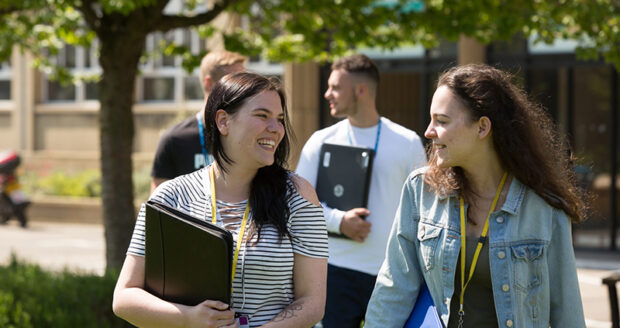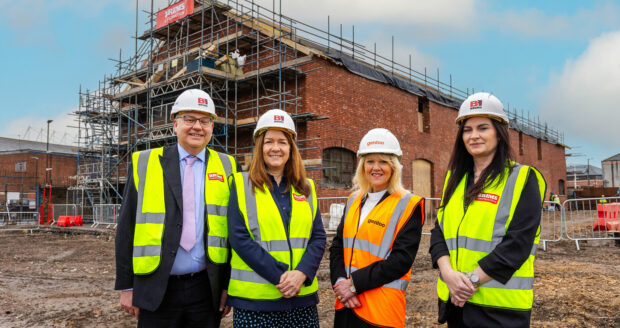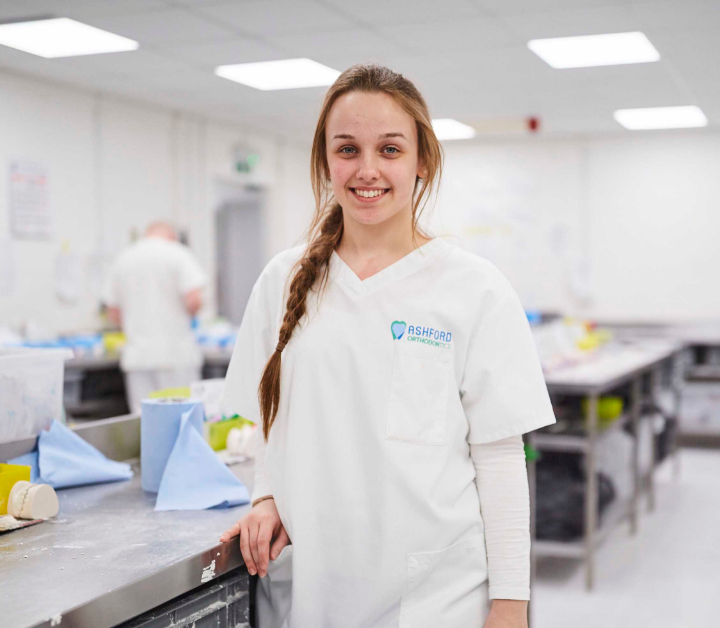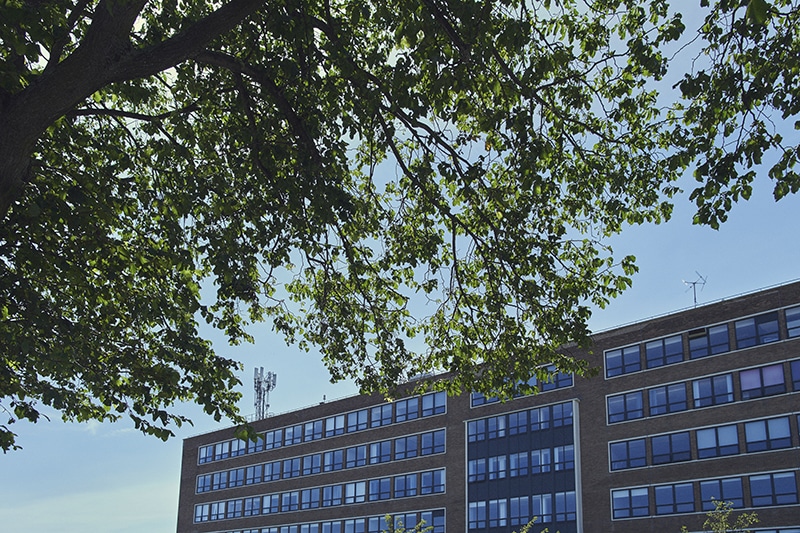Education Partnership North East is raising awareness of the role colleges can play in the ‘Race to Zero’ by sharing the progress it has made since implementing environmentally sustainable practices across its campuses.
The group, which includes Hartlepool Sixth Form, Northumberland College and Sunderland College, is committed to continuously improving its approach through the promotion of environmental awareness, transforming estates, procurement strategies, and integrating sustainability into the curriculum and wider college targets.
In academic year 2018-19, with the sustainability agenda gathering momentum, Chief Executive Ellen Thinnesen made a call to arms and formed Education Partnership North East’s first ‘Green Group’ alongside concerned colleagues. From their first meeting, the group began to explore organisational practices and share ideas for improvement. Subsequently the group began to influence cultural change.
Today, much has been achieved strategically as the group establishes itself as a sustainability leader within the Further Education sector, but it is important to celebrate the great work of the college’s support services who behind the scenes, are pivotal to the progress made.
Sustainable catering
Recognising the need to balance expenditure alongside improved approaches to sustainability, leaders of Education Partnership North East’s catering function found new ways to decrease waste while implementing environmentally friendly practices across its six college campuses.
A programme of transformation was introduced starting with the key principle that true sustainability in catering is about much more than food. Starting with a plastic reduction programme, 16,000 stirrers, 2,000 straws, 3,600 cutlery items and 29,100 bottles have been prevented from going to landfill. The use of plastic food trays has been reduced by 80% and in the last 12 months over 16,000 recyclable products have been used in place of polystyrene and non-biodegradable containers. Education Partnership North East is now on target to phase out all one-use plastic food containers by the end of 2021.
Supporting sustainable water solutions
Since the Green Group was established, recyclable bottles of water sold to staff and students have been purchased from a new supplier. For every bottle sold a significant, fixed sum is donated to Pump Aid, a charity responsible for providing clean water solutions across sub-Saharan Africa.
Sustainable waste
Thinking differently, waste oil produced by the group’s catering outlets has been recycled by a North East company. Over the last 12 months, 3,120 litres of oil have been converted into renewable energy, biofuels and fertiliser.
Darren Lawton, Food and Beverages Manager, said: “As one of the main users of disposable products it was imperative the catering department changed its purchasing and procedures in reducing one use plastics and food wastage. We have made great strides towards achieving this goal.”
Sustainable Procurement
A new Procurement Department was established with a dedicated Strategic Procurement and Contracts Manager appointed and tasked with establishing controls to sustainable procurement and vigilance regarding issues such as modern slavery, corruption, bribery and human trafficking.
Supplier deliveries were reduced from six days per week to three across all commercial catering outlets. Fresh British meat and sustainable seafood practices have been implemented and suppliers are expected to be able to supply Fairtrade, Red Lion and Red Tractor products. Local dairies are also used for milk, and all suppliers are required to have robust due diligence in place to ensure products are fully traceable.
Consideration was given to improvements in paper manufacturing and, following a trial period, the Green Group implemented a reduction in paper weight usage for Multifunction Devices across all college sites from 80 grams per square metre. The transition to a lighter weight copier paper (and overall reduction in printing) cut energy, water and waste by 8%.
As the group continues its aspiration to go paperless, 2020-21 paper consumption has protected an additional 100 trees per year, supporting significant efficiencies in the reduction of CO2.
Katrina Foster, Strategic Procurement and Contracts Manager, said: “The Procurement Department is committed to pursuing the principles of sustainable procurement in all opportunities. This means working collaboratively with our colleagues to collectively ensure our choices reduce harmful environmental impacts, waste, minimise transportation and reduce pollution.”
Sustainable Estates
Education Partnership North East’s substantial multi-campus estate, valued at over £121 million, is also benefitting from several significant improvements.
Solar PV-Photovoltaic panels have been installed across several college campuses and solar thermal panels installed to pre-heat domestic hot water within one of the group’s largest sites. This will provide a tempered hot water supply prior to being boosted by gas boilers and stored within hot water storage devices.
Building Management Systems (BMS) have been deployed ubiquitously across Sunderland College, Northumberland College and Hartlepool Sixth Form campuses ensuring all buildings operate to fixed parameters and time schedules, compensating for external weather conditions and allowing the buildings to be controlled within zones and remotely switched off when not in use. Further improvements are set to be achieved by 2024.
A programme of upgrades occurred throughout academic year 2020-21 to upgrade from candescent to LED lights, with 490 fittings replaced across Sunderland College from a total of 847. This has provided 2,961 kWh of savings weekly. Within Northumberland College campuses, 314 lights have been changed, providing a further weekly saving of 2,245 kWh.
High efficiency boilers have been deployed following major capital investment at Northumberland College’s Ashington Campus replacing inefficient end of life units. The new boilers are now controlled via a new centrally controlled BMS.
Over 500 single glazed windows have also been replaced in the main building, with argon-filled commercial grade double glazed units which are yielding significant savings and reducing the need for the college’s heating plant to operate constantly, thus preventing heat loss and improving energy efficiency.
Steve Brown, Executive Director of Capital Projects & Estates, said: “With such a large estate to manage, sustainability is considered in all aspects of our operations. From simple lamp changes during refurbishment programmes or during the planning of new buildings, we are always looking for opportunities to reduce our carbon emissions.”
Sustainable Information Technology practices
Education Partnership North East has partnered with a local company refurbishing older or obsolete equipment to sell on. This also enables the group to support a chosen charity or community group to gain new equipment. Since 2018, the college has refurbished 2,347 obsolete or broken devices, with 824 computers placed back into use and 43 recycled, the equivalent of 166,090kg of CO2 saved.
Terry Attwater, Executive Director of ICT, said: “We are continuing to promote environmental awareness and responsibility with all our IT providers and will seek to continuously improve environmental performance as we continue to deliver our digital and technology strategies”.
Ellen Thinnesen, Chief Executive, said: “Now evolved to a formal sustainability committee, our Green Group has come a long way since academic year 2018-19. I am proud of and very grateful to our environmentally conscious staff members who have helped our college achieve the great progress we have.
“In order to prevent human-caused climate damage, it is essential everyone plays their part in reducing waste and carbon dioxide emissions. Whilst there is much to do, we are heading in the right direction, and I am looking forward to sharing best practice from our curriculum teams over the coming weeks and months.”
College updates
-

Students across college group took on series of fundraising challenges
March 22, 2024
EPNE has supported the BRIT Challenge, with a number of health and wellbeing activities across all college campuses.
-

New Construction and Housing Trades Academy launched in Sunderland
March 21, 2024
An innovative new skills partnership that bridges the gap between education and the world of work has been launched in Sunderland.
-

Hundreds of students across regional college group to take on fundrais...
March 13, 2024
EPNE will be supporting the BRIT Challenge, with a number of health and wellbeing activities across all campuses on Wednesday 13 March 2024.

Why Education Partnership North East (EPNE)?

Highly commended - Employer of the Year, Sunderland Echo Portfolio Awards 2019

Engagement with Employers - Association of Colleges (AoC) Beacon Award 2017
(Sunderland College On-programme Survey 2017)

Selected by DfE for 2021 T Level pilot to deliver the new high-quality technical qualifications.

98% overall employer satisfaction - Employer Survey 2018/19


